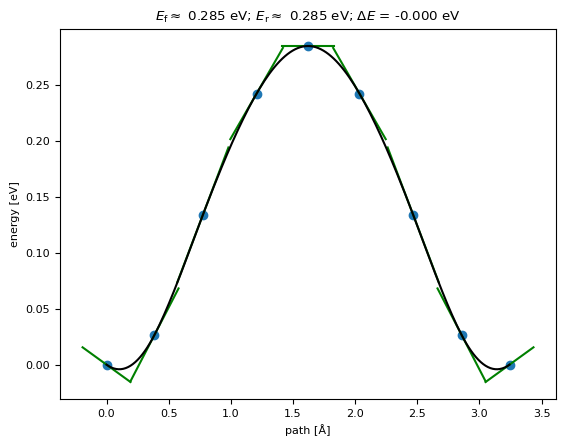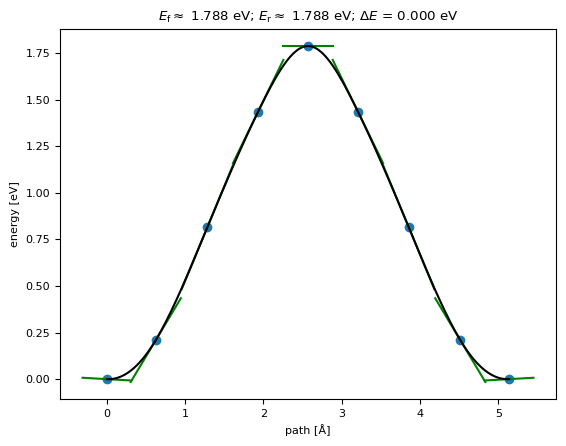Nudged Elastic Band¶
In this tutorial, we will determine the activation energies of Li diffusion along the [010] and [001] directions (referred to as paths b and c respectively) in lithium iron phosphate (LiFePO_4), a cathode material for lithium ion batteries.
DFT references energies are:
Barrier heights:
path b = 0.27 eV
path c = 2.5 eV
(see table 1 in https://doi.org/10.1039/C5TA05062F)
Set up environment (optional)¶
These steps are required to run this tutorial with Google Colab. To do so, uncomment and run the cell below.
This will replace pre-installed versions of numpy and torch in Colab with versions that are known to be compatible with janus-core.
It may be possible to skip the steps that uninstall and reinstall torch, which will save a considerable amount of time.
These instructions but may work for other systems too, but it is typically preferable to prepare a virtual environment separately before running this notebook if possible.
[1]:
# import locale
# locale.getpreferredencoding = lambda: "UTF-8"
# ! pip uninstall numpy -y # Uninstall pre-installed numpy
# ! pip uninstall torch torchaudio torchvision transformers -y # Uninstall pre-installed torch
# ! uv pip install torch==2.5.1 # Install pinned version of torch
# ! uv pip install janus-core[mace,orb,chgnet,visualise] data-tutorials --system # Install janus-core with MACE, Orb, CHGNet, and WeasWidget, and data-tutorials
# get_ipython().kernel.do_shutdown(restart=True) # Restart kernel to update libraries. This may warn that your session has crashed.
To ensure you have the latest version of janus-core installed, compare the output of the following cell to the latest version available at https://pypi.org/project/janus-core/
[2]:
from janus_core import __version__
print(__version__)
0.8.6
Prepare data, modules, and model parameters¶
You can toggle the following to investigate different models:
[3]:
model_params = {"arch": "mace_mp", "model": "medium-0b3"}
# model_params = {"arch": "mace_mp", "model": "medium-mpa-0"}
# model_params = {"arch": "mace_mp", "model": "medium-omat-0"}
# model_params = {"arch": "chgnet"}
# model_params = {"arch": "orb"}
[4]:
from weas_widget import WeasWidget
from ase.io import read
from data_tutorials.data import get_data
from janus_core.calculations.geom_opt import GeomOpt
from janus_core.calculations.neb import NEB
Use data_tutorials to get the data required for this tutorial:
[5]:
get_data(
url="https://raw.githubusercontent.com/stfc/janus-core/main/docs/source/tutorials/data/",
filename="LiFePO4_supercell.cif",
folder="data",
)
try to download LiFePO4_supercell.cif from https://raw.githubusercontent.com/stfc/janus-core/main/docs/source/tutorials/data/ and save it in data/LiFePO4_supercell.cif
saved in data/LiFePO4_supercell.cif
Preparing end structures¶
The initial structure can be downloaded from the Materials Project (mp-19017):
[6]:
LFPO = read("data/LiFePO4_supercell.cif")
v=WeasWidget()
v.from_ase(LFPO)
v.avr.model_style = 1
v.avr.show_hydrogen_bonds = True
v
[6]:
First, we will relax the supercell:
[7]:
GeomOpt(struct=LFPO, **model_params).run()
v1=WeasWidget()
v1.from_ase(LFPO)
v1.avr.model_style = 1
v1.avr.show_hydrogen_bonds = True
v1
/home/runner/work/janus-core/janus-core/.venv/lib/python3.12/site-packages/e3nn/o3/_wigner.py:10: UserWarning: Environment variable TORCH_FORCE_NO_WEIGHTS_ONLY_LOAD detected, since the`weights_only` argument was not explicitly passed to `torch.load`, forcing weights_only=False.
_Jd, _W3j_flat, _W3j_indices = torch.load(os.path.join(os.path.dirname(__file__), 'constants.pt'))
cuequivariance or cuequivariance_torch is not available. Cuequivariance acceleration will be disabled.
Downloading MACE model from 'https://github.com/ACEsuit/mace-mp/releases/download/mace_mp_0b3/mace-mp-0b3-medium.model'
Cached MACE model to /home/runner/.cache/mace/macemp0b3mediummodel
Using Materials Project MACE for MACECalculator with /home/runner/.cache/mace/macemp0b3mediummodel
Using float64 for MACECalculator, which is slower but more accurate. Recommended for geometry optimization.
Using head default out of ['default']
/home/runner/work/janus-core/janus-core/.venv/lib/python3.12/site-packages/mace/calculators/mace.py:197: UserWarning: Environment variable TORCH_FORCE_NO_WEIGHTS_ONLY_LOAD detected, since the`weights_only` argument was not explicitly passed to `torch.load`, forcing weights_only=False.
torch.load(f=model_path, map_location=device)
Step Time Energy fmax
LBFGS: 0 16:58:52 -762.842666 0.654854
LBFGS: 1 16:58:54 -763.038742 0.437508
LBFGS: 2 16:58:56 -763.090096 0.392867
LBFGS: 3 16:58:58 -763.119488 0.374220
LBFGS: 4 16:59:00 -763.172830 0.346620
LBFGS: 5 16:59:02 -763.213488 0.334927
LBFGS: 6 16:59:04 -763.256842 0.327520
LBFGS: 7 16:59:06 -763.297792 0.328964
LBFGS: 8 16:59:08 -763.342419 0.332009
LBFGS: 9 16:59:10 -763.385108 0.328513
LBFGS: 10 16:59:12 -763.427187 0.308144
LBFGS: 11 16:59:14 -763.474267 0.274918
LBFGS: 12 16:59:16 -763.528185 0.234548
LBFGS: 13 16:59:17 -763.579927 0.246328
LBFGS: 14 16:59:19 -763.627605 0.245408
LBFGS: 15 16:59:21 -763.684752 0.231582
LBFGS: 16 16:59:23 -763.766360 0.283626
LBFGS: 17 16:59:25 -763.855346 0.296599
LBFGS: 18 16:59:27 -763.931149 0.188692
LBFGS: 19 16:59:29 -763.965778 0.154808
LBFGS: 20 16:59:30 -763.996599 0.213159
LBFGS: 21 16:59:32 -764.039520 0.255107
LBFGS: 22 16:59:34 -764.108589 0.255570
LBFGS: 23 16:59:36 -764.175608 0.200210
LBFGS: 24 16:59:38 -764.208816 0.096659
[7]:
Next, we will create the start and end structures:
[8]:
# NEB path along b and c directions have the same starting image.
# For start bc remove site 5
LFPO_start_bc = LFPO.copy()
del LFPO_start_bc[5]
# For end b remove site 11
LFPO_end_b = LFPO.copy()
del LFPO_end_b[11]
# For end c remove site 4
LFPO_end_c = LFPO.copy()
del LFPO_end_c[4]
Path b¶
We can now calculate the barrier height along path b.
This also includes running geometry optimization on the end points of this path.
[9]:
n_images = 7
interpolator="pymatgen" # ASE interpolation performs poorly in this case
neb_b = NEB(
init_struct=LFPO_start_bc,
final_struct=LFPO_end_b,
n_images=n_images,
interpolator=interpolator,
minimize=True,
fmax=0.1,
**model_params,
)
Using Materials Project MACE for MACECalculator with /home/runner/.cache/mace/macemp0b3mediummodel
Using float64 for MACECalculator, which is slower but more accurate. Recommended for geometry optimization.
Using head default out of ['default']
/home/runner/work/janus-core/janus-core/.venv/lib/python3.12/site-packages/mace/calculators/mace.py:197: UserWarning: Environment variable TORCH_FORCE_NO_WEIGHTS_ONLY_LOAD detected, since the`weights_only` argument was not explicitly passed to `torch.load`, forcing weights_only=False.
torch.load(f=model_path, map_location=device)
[10]:
results = neb_b.run()
Step Time Energy fmax
LBFGS: 0 16:59:40 -758.975432 1.930990
LBFGS: 1 16:59:42 -759.140669 0.711957
LBFGS: 2 16:59:44 -759.209571 0.514600
LBFGS: 3 16:59:46 -759.298948 0.404890
LBFGS: 4 16:59:47 -759.316304 0.265548
LBFGS: 5 16:59:49 -759.336518 0.252446
LBFGS: 6 16:59:51 -759.351338 0.330410
LBFGS: 7 16:59:53 -759.368546 0.309163
LBFGS: 8 16:59:55 -759.378014 0.229741
LBFGS: 9 16:59:56 -759.386280 0.221552
LBFGS: 10 16:59:58 -759.395290 0.278156
LBFGS: 11 17:00:00 -759.404981 0.291370
LBFGS: 12 17:00:02 -759.411852 0.192426
LBFGS: 13 17:00:03 -759.415355 0.075502
Step Time Energy fmax
LBFGS: 0 17:00:05 -758.975436 1.930961
LBFGS: 1 17:00:07 -759.140671 0.711930
LBFGS: 2 17:00:09 -759.209572 0.514582
LBFGS: 3 17:00:10 -759.298949 0.404887
LBFGS: 4 17:00:12 -759.316305 0.265544
LBFGS: 5 17:00:14 -759.336519 0.252446
LBFGS: 6 17:00:16 -759.351338 0.330395
LBFGS: 7 17:00:17 -759.368546 0.309158
LBFGS: 8 17:00:19 -759.378015 0.229745
LBFGS: 9 17:00:21 -759.386281 0.221556
LBFGS: 10 17:00:23 -759.395291 0.278147
LBFGS: 11 17:00:25 -759.404982 0.291359
LBFGS: 12 17:00:26 -759.411852 0.192423
LBFGS: 13 17:00:28 -759.415355 0.075502
Step Time fmax
NEBOptimizer[ode]: 0 17:01:06 1.5090
NEBOptimizer[ode]: 1 17:01:18 1.1032
NEBOptimizer[ode]: 2 17:01:30 0.9983
NEBOptimizer[ode]: 3 17:01:42 0.8704
NEBOptimizer[ode]: 4 17:01:54 0.8013
NEBOptimizer[ode]: 5 17:02:06 0.7712
NEBOptimizer[ode]: 6 17:02:18 0.7441
NEBOptimizer[ode]: 7 17:02:30 0.6738
NEBOptimizer[ode]: 8 17:02:43 0.4346
NEBOptimizer[ode]: 9 17:03:07 0.4299
NEBOptimizer[ode]: 10 17:03:20 0.4226
NEBOptimizer[ode]: 11 17:03:32 0.3946
NEBOptimizer[ode]: 12 17:03:45 0.2843
NEBOptimizer[ode]: 13 17:04:10 0.2726
NEBOptimizer[ode]: 14 17:04:22 0.2652
NEBOptimizer[ode]: 15 17:04:35 0.2612
NEBOptimizer[ode]: 16 17:04:47 0.2552
NEBOptimizer[ode]: 17 17:05:00 0.2323
NEBOptimizer[ode]: 18 17:05:24 0.2219
NEBOptimizer[ode]: 19 17:05:37 0.2141
NEBOptimizer[ode]: 20 17:05:50 0.2087
NEBOptimizer[ode]: 21 17:06:02 0.2055
NEBOptimizer[ode]: 22 17:06:14 0.2005
NEBOptimizer[ode]: 23 17:06:26 0.1809
NEBOptimizer[ode]: 24 17:06:51 0.1729
NEBOptimizer[ode]: 25 17:07:03 0.1664
NEBOptimizer[ode]: 26 17:07:15 0.1624
NEBOptimizer[ode]: 27 17:07:27 0.1598
NEBOptimizer[ode]: 28 17:07:40 0.1559
NEBOptimizer[ode]: 29 17:07:52 0.1409
NEBOptimizer[ode]: 30 17:08:05 0.2612
NEBOptimizer[ode]: 31 17:08:29 0.0826
The results include the barrier (without any interpolation between highest images) and maximum force at the point in the simulation
[11]:
print(results)
{'barrier': np.float64(0.2847173696816294), 'delta_E': np.float64(-1.6499575394846033e-07), 'max_force': np.float64(0.09009922957482004)}
We can also plot the band:
[12]:
fig = neb_b.nebtools.plot_band()
v1=WeasWidget()
v1.from_ase(neb_b.nebtools.images)
v1.avr.model_style = 1
v1.avr.show_hydrogen_bonds = True
v1
[12]:

Path c¶
We can calculate the barrier height along path c similarly
[13]:
n_images = 7
interpolator="pymatgen"
neb_c = NEB(
init_struct=LFPO_start_bc,
final_struct=LFPO_end_c,
n_images=n_images,
interpolator=interpolator,
minimize=True,
fmax=0.1,
**model_params,
)
Using Materials Project MACE for MACECalculator with /home/runner/.cache/mace/macemp0b3mediummodel
Using float64 for MACECalculator, which is slower but more accurate. Recommended for geometry optimization.
Using head default out of ['default']
/home/runner/work/janus-core/janus-core/.venv/lib/python3.12/site-packages/mace/calculators/mace.py:197: UserWarning: Environment variable TORCH_FORCE_NO_WEIGHTS_ONLY_LOAD detected, since the`weights_only` argument was not explicitly passed to `torch.load`, forcing weights_only=False.
torch.load(f=model_path, map_location=device)
[14]:
results = neb_c.run()
Step Time Energy fmax
LBFGS: 0 17:08:35 -759.415355 0.075502
Step Time Energy fmax
LBFGS: 0 17:08:37 -758.975431 1.930990
LBFGS: 1 17:08:38 -759.140669 0.711958
LBFGS: 2 17:08:40 -759.209571 0.514601
LBFGS: 3 17:08:42 -759.298948 0.404890
LBFGS: 4 17:08:44 -759.316304 0.265548
LBFGS: 5 17:08:46 -759.336518 0.252446
LBFGS: 6 17:08:47 -759.351338 0.330410
LBFGS: 7 17:08:49 -759.368546 0.309163
LBFGS: 8 17:08:51 -759.378014 0.229741
LBFGS: 9 17:08:53 -759.386280 0.221553
LBFGS: 10 17:08:55 -759.395290 0.278156
LBFGS: 11 17:08:57 -759.404981 0.291370
LBFGS: 12 17:08:58 -759.411852 0.192426
LBFGS: 13 17:09:00 -759.415355 0.075502
Step Time fmax
NEBOptimizer[ode]: 0 17:09:37 2.3204
NEBOptimizer[ode]: 1 17:09:49 1.6499
NEBOptimizer[ode]: 2 17:10:01 0.9977
NEBOptimizer[ode]: 3 17:10:14 0.6537
NEBOptimizer[ode]: 4 17:10:38 0.4186
NEBOptimizer[ode]: 5 17:10:50 0.3969
NEBOptimizer[ode]: 6 17:11:02 0.3176
NEBOptimizer[ode]: 7 17:11:26 0.2998
NEBOptimizer[ode]: 8 17:11:51 0.2690
NEBOptimizer[ode]: 9 17:12:04 0.2608
NEBOptimizer[ode]: 10 17:12:16 0.2293
NEBOptimizer[ode]: 11 17:12:40 0.2186
NEBOptimizer[ode]: 12 17:12:52 0.2622
NEBOptimizer[ode]: 13 17:13:04 0.2009
NEBOptimizer[ode]: 14 17:13:17 0.1946
NEBOptimizer[ode]: 15 17:13:29 0.1883
NEBOptimizer[ode]: 16 17:13:41 0.1653
NEBOptimizer[ode]: 17 17:14:06 0.1600
NEBOptimizer[ode]: 18 17:14:19 0.1538
NEBOptimizer[ode]: 19 17:14:31 0.1475
NEBOptimizer[ode]: 20 17:14:44 0.1379
NEBOptimizer[ode]: 21 17:14:56 0.1346
NEBOptimizer[ode]: 22 17:15:09 0.1288
NEBOptimizer[ode]: 23 17:15:21 0.1263
NEBOptimizer[ode]: 24 17:15:33 0.1169
NEBOptimizer[ode]: 25 17:15:45 0.1806
NEBOptimizer[ode]: 26 17:16:09 0.0821
[15]:
print(results)
{'barrier': np.float64(1.787575440772347), 'delta_E': np.float64(4.249386620358564e-09), 'max_force': np.float64(0.09762768267248513)}
[16]:
fig = neb_c.nebtools.plot_band()
v2=WeasWidget()
v2.from_ase(neb_c.nebtools.images)
v2.avr.model_style = 1
v2.avr.show_hydrogen_bonds = True
v2
[16]:
